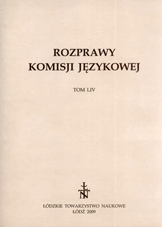Antropomorfizácia v lexike
Anthropomorphization in a lexicon
Author(s): Martin OloštiakSubject(s): Language and Literature Studies
Published by: Łódzkie Towarzystwo Naukowe
Summary/Abstract: The paper aims at ascribing human attributes to a lexicon of a natural language. The ascription is carried out on the basis of these aspects: impossibility of exact quantification, bilaterality, non-isolation, uniqueness, temporal determination. Both population and lexicon cannot be exactly quantified. Both human beings and lexemes are bilateral (lexeme: meaning + form, human being: body + soul). Both human beings and lexemes are characterized by a number of miscelaneous relations with other units. Every human being is unique, one and only. The same can be referred to a lexeme. The existence of two completely identical humans as well as lexemes is impossible. Both humans and lexemes are temporalily determined, people are born, grow up, grow old and die. However, as far as temporal aspect is concerned there are several differences when comparing people and lexemes. Human being has to die, lexical death is potential, not necessary. Lexical existence and death is regulated by the naming needs of a speech community and an ability of a language to satisfy those naming needs.
Journal: Rozprawy Komisji Językowej
- Issue Year: 2009
- Issue No: 54
- Page Range: 97-107
- Page Count: 11
- Language: Slovak

